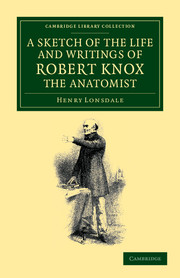
-
Select format
-
- Publisher:
- Cambridge University Press
- Publication date:
- October 2014
- September 2013
- ISBN:
- 9781107323827
- 9781108065290
- Dimensions:
- Weight & Pages:
- Dimensions:
- (216 x 140 mm)
- Weight & Pages:
- 0.57kg, 448 Pages
You may already have access via personal or institutional login
Book description
Among the ablest anatomical teachers of his day, Robert Knox (1791–1862) also busied himself with the study of zoology and ethnology. Prepared by his pupil and colleague Henry Lonsdale (1816–76), this 1870 biography explores the scope of Knox's scientific research and the nature of his character. It describes how Knox developed at Edinburgh one of the most significant anatomical schools in Britain, playing a dominant role in expanding the comparative anatomy collection held by the city's Royal College of Surgeons. Despite his eminence and popularity as a lecturer, his reputation was deeply tarnished by his association with the notorious murderers Hare and Burke, who had provided Knox with bodies for dissection. Drawing on surviving correspondence and information gathered from friends and colleagues, Lonsdale's work stands as a robust defence and sympathetic portrait of a prominent yet controversial figure in the history of nineteenth-century medicine.
Contents
Metrics
Altmetric attention score
Full text views
Full text views help Loading metrics...
Loading metrics...
* Views captured on Cambridge Core between #date#. This data will be updated every 24 hours.
Usage data cannot currently be displayed.
Accessibility standard: Unknown
Why this information is here
This section outlines the accessibility features of this content - including support for screen readers, full keyboard navigation and high-contrast display options. This may not be relevant for you.
Accessibility Information
Accessibility compliance for the PDF of this book is currently unknown and may be updated in the future.


